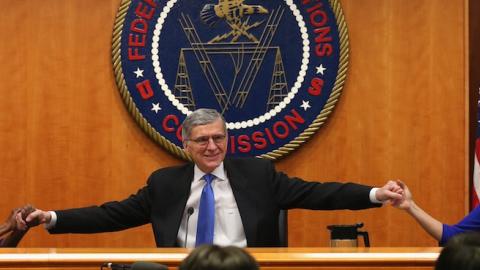Just a few short years ago, the mantra in both Silicon Valley and Washington was “Do Not Regulate the Internet.” Politicians of all political persuasions used those four words to signal support for the Internet. How times have changed.
Today, many Internet companies genuinely support the FCC’s regulation of the Internet Perhaps those companies take the Federal Communications Commission at its word that it will apply only the lightest touch of regulation. Perhaps they think support of network neutrality will curry favor with the administration on other issues. Perhaps they think they will be able to harness the power of the federal government against their rivals.
The elegance of the FCC’s action, popularly known as Network Neutrality, is that Silicon Valley actively welcomed it. Businesses wise to the ways of the Internet, but remarkably naive about the ways of Washington, think that network neutrality is a good idea. Washington defeated and subjugated Silicon Valley without a fight.
Of course, Washington may yet suffer setbacks in the Internet Wars. Judges may suggest that the FCC has exceeded its powers. Title II regulation of the Internet is not in the law. If anything, statutes warn against Title II for the Internet.
But in recent years, many judges have grown weary of telecommunications cases under Title II. The cases involve engineering concepts with obscure words and more obscure definitions. A good judge can wade through difficult technical arguments. Or a good judge can cite Chevron deference and move on to the next case. It is about a 50-50 chance which way the Title II case will go.
The FCC is on even weaker grounds with “forbearance,” the concept the FCC has been touting as a way not to impose all of the punishing regulations of Title II. This means that the FCC has the power to regulate the Internet but will forbear from doing so.
The FCC’s legal theory of forbearance likely will not work. The commission has never before designated a service as a “telecommunications service” and, in the same breath, determined that the vast majority of regulations, as a result of regulation, need not apply. Indeed, the FCC has never determined that the vast majority of regulations need not apply for any service, no matter how competitive. Advocacy groups and competitors will, no doubt, march into court and challenge the FCC’s flimsy pretense of forbearance. On this specific issue, the FCC is likely to lose.
Stated differently, those looking to the courts to protect the American consumer and Silicon Valley from the excesses of the FCC are likely to be disappointed. A very possible outcome is the worst of all worlds: Title II regulation with little or no forbearance.
Of course, even if the FCC were to prevail on forbearance in court, it is of little comfort to the American consumer. An FCC that can wave a magic wand to forbear from a regulation today can wave the same wand tomorrow and regulate once again. The raised eyebrow will be ever vigilant in observing which companies have been nice, and which don’t deserved continued forbearance.
The power of the FCC under network neutrality to regulate the Internet, if not constrained by judges, will be neither light nor lenient. Friends can be helped and enemies punished, but the discretion to use the power will reside in Washington, not Silicon Valley.
Under the old Internet, businesses competed against rivals for consumers with better products, better services and better ideas. Under the new Internet, one seeks to have a Washington bureaucracy hobble a rival.
Under the old Internet, businesses succeeded with innovative technological and market ideas. Under the new Internet, businesses will succeed with innovative legal and regulatory ides.
The FCC promises that it will use a light touch in regulation. Washington deception is an opiate for the investment analytical masses. Title II, euphemistically called Network Neutrality, gives the FCC the power to regulate practically every business decision of every Internet company.
Some naïve analysts believe the only harm of Title II is price regulation. Price regulation is only the last in a long line of punishing regulations the FCC will impose on the Internet industry. Limitations on expansions and contractions of services; limitations on the use of customer information; limitations on privacy; limitations on disability access; billions of dollars of annual payments for state and federal fees and taxes; threats of actions; and countless unknown other surprises await the well-behaved Internet company. Price regulation is just the prison cell that awaits firms that are not defeated by other regulations.
And for the less-than-well-behaved Internet company, the punishments of raised eyebrows are unending. Donate to the wrong political party; make an unwelcome statement; dare to challenge the Internet regulator. Those are the mistakes made by companies unaware that Internet wars were lost by Silicon Valley. Washington won.
Consumers are the collateral damage. Every partisan in Washington claims to represent consumers. Of course, consumers had real friends on the Internet. Those were the companies that, as a result of unregulated competition, offered better products and services. The next day, they were replaced by even more competitive companies offering even better products and services. When businesses compete on the Internet, consumers are sovereign.
In a regulated Internet, consumers lose because businesses get ahead by pleasing Washington, not competing for customers. Consumers lose.
Today, Silicon Valley is a beacon of hope and inspiration not only to the best and brightest of the world but to ordinary individuals seeking a better life and a better way of life, free from the crushing power of a too-powerful government. Now that Silicon Valley has been defeated by Washington, what will be the beacon of hope?
















